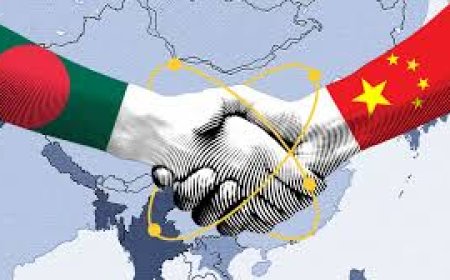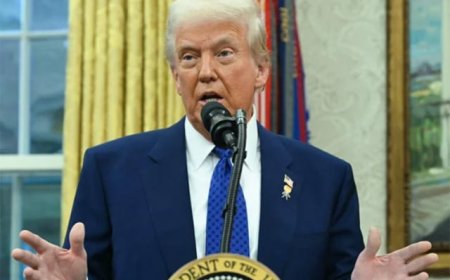Netanyahu: Gaza attacks are just the start
The attacks, the most intense since the truce began in January, have claimed the lives of over 400 people throughout the Gaza Strip.

Israeli Prime Minister Benjamin Netanyahu warned on Tuesday that the massive overnight strikes on Gaza were "only the beginning" and that any future negotiations with Hamas would take place "only under fire." The strikes, the most intense since a truce began in January, have killed more than 400 people across the Gaza Strip, according to the health ministry in the Hamas-controlled territory.
In a video statement, Netanyahu declared, "Hamas has already felt the strength of our arm in the past 24 hours. And I want to promise you – and them – this is only the beginning."
Negotiations remain deadlocked over the next steps in the ceasefire, whose first phase has expired, with Israel and Hamas at odds over moving toward a broader agreement to end the war.
The Israeli leader stated, "From now on, negotiations will take place only under fire," emphasizing that "military pressure is essential for the release of additional hostages."
Israel has pledged to continue its offensive until all hostages taken by Palestinian fighters during an October 2023 attack—an event that triggered the war—are returned.
By Tuesday afternoon, Gaza residents reported that the strikes had mostly ceased, though sporadic bombing persisted.
"Today, I felt that Gaza is a real hell," said Jihan Nahhal, a 43-year-old woman from Gaza City, who noted that some of her relatives were injured or killed in the attacks.
"Suddenly, there were huge explosions, as if it were the first day of the war."
Hamas has not launched a military response so far, instead urging allied nations to "pressure" the United States to halt Israel's strikes.
Hugh Lovatt, a senior policy fellow at the European Council on Foreign Relations, told AFP, "Hamas does not want to be dragged into another war."
The White House confirmed that Israel had consulted U.S. President Donald Trump's administration before carrying out the strikes, while Israel stated that its return to combat was "fully coordinated" with Washington.
A State Department spokesperson said, "Hamas bears total responsibility... for the resumption of hostilities."
The United Nations and several world governments condemned the attacks, while families of Israeli hostages urged Netanyahu to halt the violence, fearing for the safety of their loved ones.
'Complete Destruction'
Netanyahu's office said Tuesday's military operation was ordered after "Hamas’s repeated refusal to release our hostages."
Hamas accused Israel of "deciding to overturn the ceasefire agreement" brokered by U.S., Qatari, and Egyptian mediators, warning that renewed fighting would "impose a death sentence" on the remaining hostages.
Hamas leader Sami Abu Zuhri told AFP that Israel's aim was "to impose a surrender agreement, writing it in the blood of Gaza."
Israeli Defense Minister Yoav Gallant warned that Hamas must recognize that "the rules of the game have changed," vowing to continue military operations until the group's "complete destruction" if it did not immediately release the hostages.
Hamas reported that Essam al-Dalis, the head of its government in Gaza, was among several officials killed in the strikes.
In southern Gaza, AFP footage captured civilians rushing wounded individuals—including children—on stretchers to hospitals. Bodies covered in white shrouds were also seen being transported to morgues.
'Shocking'
Gaza's health ministry reported that 413 bodies had been recovered at hospitals, adding that "many victims remain trapped under the rubble."
Rosalia Bollen, a spokesperson for UNICEF in southern Gaza, told AFP that the dead included "dozens and dozens of children, with many more wounded."
She warned that medical facilities, already crippled by the war, were now "overwhelmed."
In Jerusalem, families of Israeli hostages protested outside Netanyahu’s office, with a campaign group accusing the government of "causing the explosion of the ceasefire, which could sacrifice their family members."
Governments across the Middle East, Europe, and beyond urged an end to the renewed hostilities.
"The images of burning tents in refugee camps are shocking. Fleeing children and internally displaced persons must never be used as leverage in negotiations," said German Foreign Minister Annalena Baerbock.
Iran, a key Hamas backer, condemned the strikes as "a continuation of genocide" in the Palestinian territories, while Russia and China warned against further escalation.
Egyptian President Abdel Fattah al-Sisi stated that the strikes were part of "deliberate efforts to make the Gaza Strip uninhabitable and force the Palestinians into displacement."
Former U.S. President Trump has floated a proposal to relocate Palestinians out of Gaza, an idea rejected by Palestinian leaders and governments across the region, though some Israeli politicians support it.
Hours after the latest strikes began, Netanyahu’s Likud party announced that a far-right faction that had previously left the government in protest of the January ceasefire had decided to rejoin.
Attack from Yemen
The ceasefire in Gaza had taken effect on January 19, largely halting hostilities.
The first phase of the deal ended in early March after a series of exchanges involving Israeli hostages and Palestinian prisoners.
However, further negotiations have stalled, with Hamas insisting on talks for a second phase that would lead to a permanent ceasefire, while Israel had sought to prolong the first phase by restricting aid and electricity to Gaza.
Since the October 7, 2023, Hamas-led attack, Israel’s military campaign in Gaza has killed at least 48,577 people, mostly civilians.
Of the 251 hostages initially taken, 58 remain in Gaza, including 34 whom the Israeli military believes to be dead.
On Tuesday evening, Yemen’s Iran-backed Houthi rebels—who have launched attacks in solidarity with Palestinians—fired a missile at Israel, which the Israeli military said was intercepted.
What's Your Reaction?





















































































